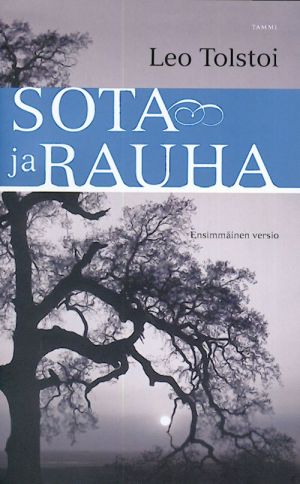Suomentanut Eero Balk
Kirjallinen sensaatio - maailmankirjallisuuden suurimpiin kuuluva romaani "lukijaystävällisenä" alkuperäisversiona
Tolstoin Sota ja rauha on maailmankirjallisuuden tunnetuimpia romaaneja, josta on myös tehty useampia elokuvasovituksia, mutta sen laajuus, lähes 2000 sivua, ja runsaat filosofiset pohdiskelut ja taistelukuvaukset ovat pelottaneet lukijoita sen ääreltä. Tolstoi-museon tutkija Evelina Zaidenshnur (Seidenschnur) onnistui kuitenkin 1980-luvulla rekonstruoimaan romaanin ensimmäisen version, joka oli valmistunut 1866 ja jonka Tolstoi sitten 1867-69 muokkasi ja laajensi tähän asti tunnetuksi versioksi.
Tämä ensimmäinen versio julkaistiin kirjana Venäjällä 2000 varustettuna mainoslausein: "Puolta lyhyempi ja viisi kertaa kiinnostavampi", "Paljon enemmän rauhaa ja vähemmän sotaa", "Sata kertaa helpompi lukea". Siitä huolimatta se on täyttä Tolstoita, elämää ja tunteita, aatteita ja moraalia pursuava romaani, joka esittelee kolme aivan erilaista perhettä, huvittelulle ja nautinnoille omistautuneet pietarilaiset Kuraginit, elämäniloiset ja tunteikkaat moskovalaiset Rostovit ja ankaran aatteelliset ja velvollisuudentuntoiset maalaisaateliset Bolkonskit, sekä Pierre Bezuhovin, kömpelön mutta viehättävän vilpittömän nuoren perijän, keskellä Napeoleonin sotien ja Venäjän-retken aiheuttamaa myllerrystä. On yllättävää huomata, miten samanlainen Eurooppa olikaan jo silloin, 200 vuotta sitten.
Tolstoy's major work, War and Peace, appeared between the years 1865 and 1869. The epic tale depicted the story of five families against the background of Napoleon's invasion of Russia. Its vast canvas includes 580 characters, many historical, others fictional. The story moves from family life to the headquarters of Napoleon, from the court of Alexander to the battlefields of Austerlitz and Borodino. War and Peace reflected Tolstoy's view that all is predestined, but we cannot live unless we imagine that we have free will. The harshest judgment is reserved for Napoleon, who thinks he controls events, but is dreadfully mistaken. Pierre Bezukhov, who wanders on the battlefield of Borodino, and sees only the confusion, comes closer to the truth. Great men are for him ordinary human beings who are vain enough to accept responsibility for the life of society, but unable to recognize their own impotence in the cosmic flow. "No one has ever excelled Tolstoy in expressing the specific flavour, the exact quality of a feeling - the degree of its 'oscillation', the ebb and flow, the minute movements (which Turgenev mocked as a mere trick on his part) - the inner and outer texture and 'feel' of a look, a thought, a pang of sentiment, no less than of a specific situation, of an entire period, of the lives of individuals, families, communities, entire nations."
Tolstoy's major work, War and Peace, appeared between the years 1865 and 1869. The epic tale depicted the story of five families against the background of Napoleon's invasion of Russia. Its vast canvas includes 580 characters, many historical, others fictional. The story moves from family life to the headquarters of Napoleon, from the court of Alexander to the battlefields of Austerlitz and Borodino. War and Peace reflected Tolstoy's view that all is predestined, but we cannot live unless we imagine that we have free will. The harshest judgment is reserved for Napoleon, who thinks he controls events, but is dreadfully mistaken. Pierre Bezukhov, who wanders on the battlefield of Borodino, and sees only the confusion, comes closer to the truth. Great men are for him ordinary human beings who are vain enough to accept responsibility for the life of society, but unable to recognize their own impotence in the cosmic flow. "No one has ever excelled Tolstoy in expressing the specific flavour, the exact quality of a feeling - the degree of its 'oscillation', the ebb and flow, the minute movements (which Turgenev mocked as a mere trick on his part) - the inner and outer texture and 'feel' of a look, a thought, a pang of sentiment, no less than of a specific situation, of an entire period, of the lives of individuals, families, communities, entire nations."













